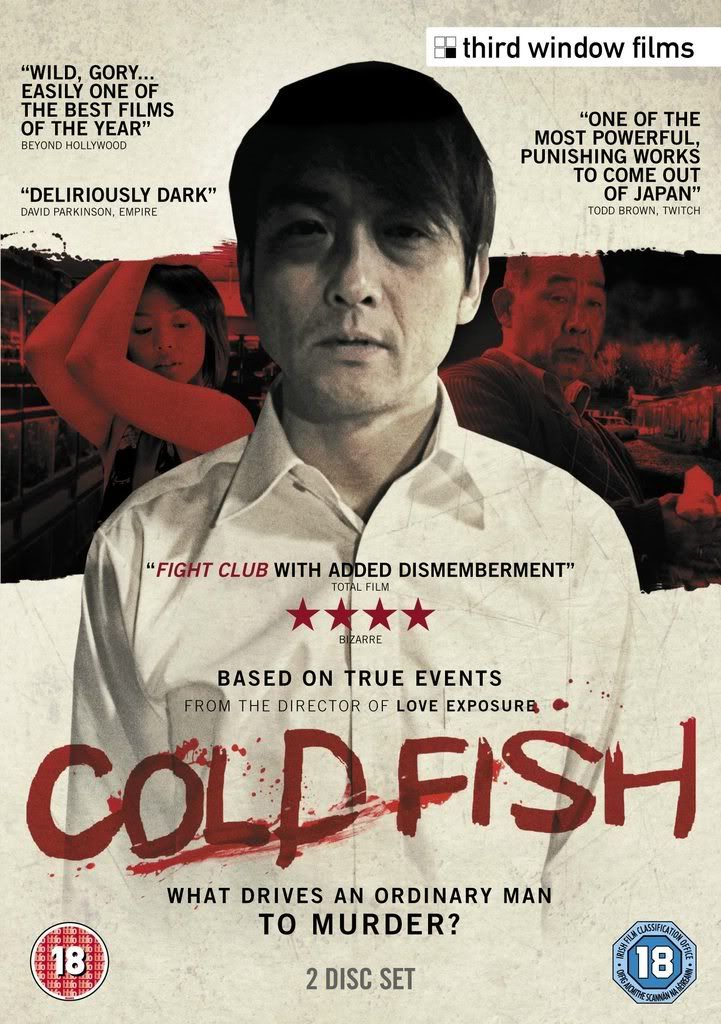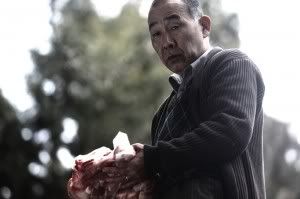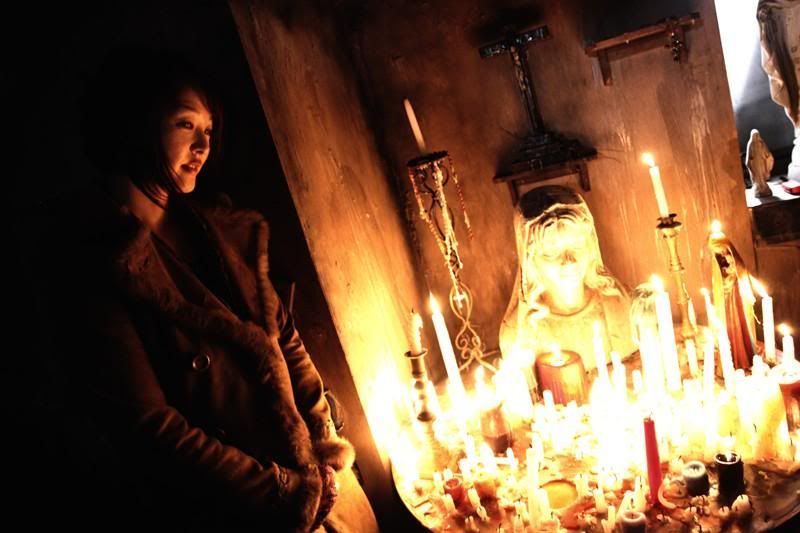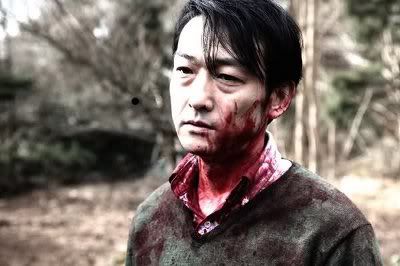Cold Fish

Title: Cold Fish
Rating: 4/5
Genre: Dark Drama/Thriller
Starring: Denden, Mitsuru Fukikoshi
Director: Sion Sono
Language: Japanese
 In case you missed my review of Sion Sono's “Love Exposure,” it was one of the greatest discoveries I made last year (and let's be honest, at four hours long I wouldn't blame you) and so when I heard news he was following up with a two and a half hour lesson in the tropical fish trade, based on a true story (albeit loosely), I knew I needed get my hands on it. When Mitsuko, the daughter of the mild mannered tropical fish store owner Nobuyuki Syamoto and his wife Taeko, is caught shoplifting, it is fellow – albeit far more successful – tropical fish store owner Yukio Murata that convinces the owner of the store being robbed to let her off, and quickly his forceful nature results in the two men carving an uneasy rapport. Quietly agreeing to let Mitsuko work at Yukio's shop, he soon finds discussions beginning to arise of him being invited to the business as a partner with him and his wife, Aiko, but it isn't long before the veil is lifted and Yukio's true nature is revealed. Selling fish off for an extortionate price and lying about their true value, anyone showing suspicion at his practices soon finding themselves being made 'invisible,' but now that Syamoto knows, is it already too late?
In case you missed my review of Sion Sono's “Love Exposure,” it was one of the greatest discoveries I made last year (and let's be honest, at four hours long I wouldn't blame you) and so when I heard news he was following up with a two and a half hour lesson in the tropical fish trade, based on a true story (albeit loosely), I knew I needed get my hands on it. When Mitsuko, the daughter of the mild mannered tropical fish store owner Nobuyuki Syamoto and his wife Taeko, is caught shoplifting, it is fellow – albeit far more successful – tropical fish store owner Yukio Murata that convinces the owner of the store being robbed to let her off, and quickly his forceful nature results in the two men carving an uneasy rapport. Quietly agreeing to let Mitsuko work at Yukio's shop, he soon finds discussions beginning to arise of him being invited to the business as a partner with him and his wife, Aiko, but it isn't long before the veil is lifted and Yukio's true nature is revealed. Selling fish off for an extortionate price and lying about their true value, anyone showing suspicion at his practices soon finding themselves being made 'invisible,' but now that Syamoto knows, is it already too late?He seems to be developing a knack for creating something unconventional; the genuinely genre hopping Avant-Garde nature of his last offering and now something that seems to defy classification altogether; sort of a strange hybrid of the naturalistic and gore-tastic comedy moments derived from the Japanese Horror/Comedy scene, the slow descent into madness of Kubrick's “The Shining,” the gritty finalé of Trier's “Antichrist,” and yet in piecing together these specific elements together he forms more than simply a patchwork quilt of genres, flowing seamlessly to lend a film entirely unlike anything I else I could name. If there was, however, but one guarantee I could give you about this film, it's that you shouldn't go into this expecting some light viewing for this is not a popcorn flick; it might sound relatively simple but it's ultimately all down to what's being said and done, the necessity for coercion and confidence in business, of relationships and how they falter, and this is where the films beauty truly lies.
As we tread the depths of their lucrative business we become tangled in this spiders web of lies and deceit, never truly sure of who can be trusted. Everyone harbours a secret or two and yet
 remain unable to speak their mind, trapped in this world with Murata's faked smile lying in the middle of it all. It's complex with each character becoming more detailed as we are struck by a constant influx of information, better defining where they stand in the context of the film. It's such a simple plot but it's so immensely detailed that it never feels slow, using their relationships to explore the consequences of mental and physical abuse; of the dependency others have on one another, the responsibility that comes with that dependency and the benefits of holding complete trust in another along with the consequences of losing that trust; and ultimately the film focusses on the the ill fate of a man who never truly learned what it meant to be independent, for as depraved as Murata's mind may be there are still life lessons that can be learned from him.
remain unable to speak their mind, trapped in this world with Murata's faked smile lying in the middle of it all. It's complex with each character becoming more detailed as we are struck by a constant influx of information, better defining where they stand in the context of the film. It's such a simple plot but it's so immensely detailed that it never feels slow, using their relationships to explore the consequences of mental and physical abuse; of the dependency others have on one another, the responsibility that comes with that dependency and the benefits of holding complete trust in another along with the consequences of losing that trust; and ultimately the film focusses on the the ill fate of a man who never truly learned what it meant to be independent, for as depraved as Murata's mind may be there are still life lessons that can be learned from him.But that's not to say that he doesn't know how to play his audience, and this spiralling overwhelming sense of depression could quickly become too overwhelming if not for the occasional comic relief; Murata's business partners' simple minded driver the most obvious example of this, often seen chuckling to himself or acting completely oblivious of the atrocities being committed before his eyes, or Murata and his wife as they joke about their latest victim whilst they butcher him in preparation for making him 'invisible.' The actor's involved never fail to do a remarkable job of the impossible script laid out before them, genuinely feeling as though they've stepped into the role they're intending to play and never as though they're unsure of their feelings in any of the difficult situations that arise. Despite how quickly characters come (and in some cases go) and situations can arise they always manage to give it a sense of grounding, tethering it to believability and lending much of the films eventual impact, and pivotal to it all is the magnificent performance of Murata himself who from the very outset draws our suspicion in his outward façade of boisterous upbeat energy.
It may not be a horror film but if you've seen anything else of Sion Sono's work you should prepare yourself for no shortage of blood; graphical images of dead bodies litter rooms, blood covering the walls like some sort of sadists artwork fantasy; rape becomes devalued as something
 that 'just happens,' and as we follow our protagonist through this maze where a wrong turn could mean you're next in the body bag he steadily ramps up the anté, building up elegantly to breaking point. It's graphic but never merely gratuitous, always serving a purpose in the context of the film. To call this 'dark' doesn't quite cut it; that final scene is so unflinching in its unwavering desires, that when it finally hits you just how successfully the viewer has been desensitized to the proceedings, it becomes so sickeningly difficult to watch and – much like the finalé for Takeshi Miike's “Audition” – his vision never flinches and the camera will never shy away. There is no happy ending to be found, only a sickening poetry; a cyclical ending that could easily just be another beginning in this depraved tale. Who knew the tropical fish trade could be so bloodthirsty?
that 'just happens,' and as we follow our protagonist through this maze where a wrong turn could mean you're next in the body bag he steadily ramps up the anté, building up elegantly to breaking point. It's graphic but never merely gratuitous, always serving a purpose in the context of the film. To call this 'dark' doesn't quite cut it; that final scene is so unflinching in its unwavering desires, that when it finally hits you just how successfully the viewer has been desensitized to the proceedings, it becomes so sickeningly difficult to watch and – much like the finalé for Takeshi Miike's “Audition” – his vision never flinches and the camera will never shy away. There is no happy ending to be found, only a sickening poetry; a cyclical ending that could easily just be another beginning in this depraved tale. Who knew the tropical fish trade could be so bloodthirsty?
Comments
Post a Comment